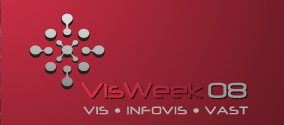Sessions » Workshops
» Workshop 1, Sunday, All Day
Knowledge Assisted Visualization (KAV)
http://kav.cs.wright.edu/
Most of the existing visualization techniques and systems were not designed to utilize the knowledge and information derived from the process of scientific visualization or from abstract data analysis. As visual exploration is an inherently iterative process, it is highly desirable to enable more effective visualization by utilizing information about the visualization process itself, and information about the scientific data to be visualized. The combination of such information from different visualization processes can also infer new knowledge that can aid data visualization in an intelligent manner if it is stored and organized in a structured fashion.
KAV2008 aims at stimulating the research efforts for knowledge- and information-assisted visualization by providing a forum for shaping this important and exciting research area. In this workshop, there will be 10 presentations which were selected from 16 submissions by an international program committee (IPC). Each submission is reviewed by 4 IPC members, and the overall quality of the submissions clearly shows the increasing research activities and new technical advances in this area. This DVD contains the abstracts of the 10 accepted presentations, covering several aspects of this new challenge.
» Workshop 2,
Monday, Morning
From Theory to Practice: Design, Vision and Visualization
http://www.stonesc.com/Vis08_Workshop/
The goal of this workshop is to begin to distill those synergies at the intersection of design, vision and visualization that can be clearly taught and applied. Many participants in the Vis week community appreciate that vision and design theory are relevant to the design of interactive visualization. Moving from theory to practice, however, is much more challenging.
We propose to work bottom-up by bringing together individuals with practical experience working across these boundaries, either within their own work, or within collaborations. By focusing on specific examples of problems and solutions, we hope to find common themes and concepts that can be further exploited and explored.
This will be a small, focused workshop with two goals:
- Preparing the ground for a special issue (probably for Information Visualization)
- Developing a short course on what is known and pragmatically feasible for Vis 2009, or for other educational resources
Erratum: To avoid conflicting with InfoVis Papers Session: Design at 2 PM Monday, this workshop will take place from 10.30 AM - 1.30 PM.
» Workshop 3,
Monday, Afternoon
Understanding Federal Funding: Agencies, Initiatives, and Peer Review
This workshop is intended to serve as an introduction for attendees to at least a few of the federal agencies that have visualization concerns. Lectures providing overviews of federal agencies will be followed by surveys of funding opportunities past and present as well as talks covering the peer- review process. Part of the available workshop time will be directed toward one-on-one conversations between agency representatives and participants. The intent is to provide young researchers an opportunity to learn about grantsmanship from representatives of federal funding agencies as well as provide those representatives with a forum to articulate their position on and announce opportunities for visualization research.
» Workshop 4,
Tuesday, All Day
Scientific Workflow with Immersive Interfaces for Visualization
http://cave-wiki.dri.edu/vrvis
The goal of this workshop is to present ways in which immersive interfaces can be integral, sometimes irreplaceable, components of the scientific process. The technical scope will cover scientific visualization efforts both with and without the aid of immersive displays. It is our position that the scientific workflow can be enhanced by immersive interfaces. Workshop presenters will be asked to specifically address their findings that concur or differ from this position.
Immersive interface and display systems (aka "Virtual Reality") have been touted since 1989 as a great new medium for interacting with computer simulated data. As is often the case for new technologies, VR followed a curve known as the "New Technology Hype Cycle" as promoted by the Gartner Group. Their observation is that after a new technology comes along, the expectations from that technology rise very rapidly, until it reaches the "peak of inflated expectations." From the peak the public awareness of the technology falls to the "trough of disillusionment", gradually rising again through the "slope of enlightenment", and finally reaching the "plateau of productivity." It is our contention that VR is now in the "slope of enlightenment" phase, and thus it's usefulness is now being explored in a reasonable manner, and in the near future it will be showing regular benefit to the scientific process. Thus, we feel it is time for the larger visualization community to revisit immersive technology as a useful interface to scientific data.
Our focus then is on looking to immersive interfaces as a means of better serving the domain scientist. And to that end, we will have domain scientists involved in the workshop to give their perspective along side the visualization researchers.
Our intent is to use the presentations and discussion of the workshop as a springboard for a report on the areas in which immersive interfaces have and can continue to improve the scientific process.
» Workshop 5,
Friday, Morning
Body of Knowledge for Visual Analytics Education
http://ike.donau-uni.ac.at/va-education-workshop/
Our workshop is designed to develop and discuss with experts a body of knowledge for Visual Analytics education with the goal of providing a basis for university curricula with particular focus on postgraduate education. The outcome of our workshop will be summarized in a white paper, including recommendations for further development of (postgraduate) Visual Analytics education.
» Chairs
Lars Linsen, Jacobs University
Chris Weaver, Penn State
For more information or to contact the chairs, please email to visweekworkshops@listserv.ieee.org.






 Week-at-a-Glance
Week-at-a-Glance

